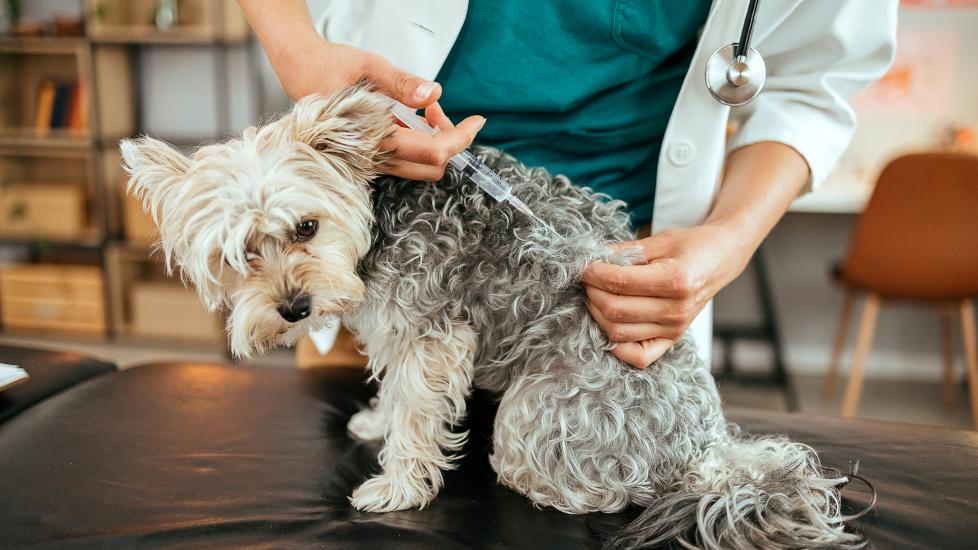Librela For Dogs (Bedinvetmab Injection)
eclipse_images/E+ via Getty Images via Getty Images
PetMD’s medications content was written and reviewed by veterinary professionals to answer your most common questions about how medications function, their side effects, and what species they are prescribed for. This content shouldn’t take the place of advice by your vet.
What Is Librela Used for in Dogs?
Librela (bedinvetmab) injection is a medication used for the control of pain associated with osteoarthritis (OA) in dogs.
The FDA-approved injection is given to dogs once a month by a veterinarian, typically in a vet office setting.
OA is a painful, chronic condition that affects dogs of all ages, sizes, and breeds—not just older dogs. OA symptoms include:
-
Reluctance to rise from rest
-
Difficulty jumping or navigating stairs
-
Decreased willingness to play
-
Decreased muscle tone
-
Stiffness
-
Swollen joints
-
A “bunny hop” walk (both back legs held tightly together)
Librela Considerations in Dogs
Librela should not be administered to the following dogs:
-
Dogs with known hypersensitivity to bedinvetmab
-
Breeding, pregnant, or lactating dogs
Librela has not been evaluated in dogs with a history of cruciate ligament rupture in the past six months or in dogs less than 12 months old.
It is important to note that dogs may develop anti-bedinvetmab antibodies, which can result in Librela injections losing effectiveness over time.
If your dog has new health problems or their health has recently changed, further tests may be recommended prior to starting or continuing Librela.
Librela is approved only for dogs at this time and should not be used in any other species.
How Librela Works in Dogs
The active ingredient in Librela is bedinvetmab. It’s classified as a monoclonal antibody, which is a lab-made protein developed to target certain parts of the body.
In dogs with OA, cartilage breaks down in the joints, which causes the bones to rub together and cause pain.
Bedinvetmab specifically binds to a protein messenger called nerve growth factor (NGF), which blocks its ability to communicate pain signals to the brain, thereby preventing the dog from feeling pain.
Librela for Dogs Directions
Librela is available only by prescription and must be administered at a veterinary practice.
It is not available for administration at home because your vet’s professional expertise is needed to properly diagnose pain associated with osteoarthritis in your dog, administer the injection, and monitor the safe use of Librela.
Librela is given as an under-the-skin (subcutaneous) injection once a month, and the dosage is determined by your dog’s weight.
Missed a Dose?
If you forget to bring your dog in for their monthly injection, please contact your veterinarian. They will typically schedule an appointment for your dog every four weeks to administer the injection and observe your dog’s response to Librela.
Possible Side Effects of Librela in Dogs
Librela is generally well-tolerated in dogs. Side effects are uncommon but may include:
-
Pain at the injection site
-
Abnormal skin at the injection site (dermatitis)
-
Elevated BUN kidney level
-
Loss of effectiveness over time
After the approval of Librela, additional side effects were reported to the FDA/CVM (FDA Center for Veterinary Medicine) including:
-
Neurological:
-
Ataxia (loss of balance)
-
Paresis (weakness)
-
Proprioception deficits (knuckling of the paws)
-
General:
-
Loss of appetite (anorexia)
-
Tiredness (lethargy)
-
Recumbency (unable to rise from rest)
-
Urinary:
-
Straining to urinate
-
Musculoskeletal:
-
Weakness
-
Limping
Serious side effects can occur with or without warning. Death (including euthanasia) has been reported as a result of the side effects above.
Speak with your vet to discuss the risks and benefits of Librela for your dog.
Human Side Effects
Librela is not an approved medication for humans and accidental injection may cause harm.
Women who are pregnant, breastfeeding, or trying to conceive should take extreme care to avoid accidental self-injection. Allow veterinary staff to hold and position your dog upon administration by your veterinarian.
Hypersensitivity reactions, including anaphylaxis, could potentially occur in the case of accidental self-injection. If an accidental self-injection occurs, seek medical advice immediately and show the package leaflet or the label to the physician.
When To Call Your Vet
Call your veterinarian if any of the following apply:
-
Severe side effects are seen (see above)
-
Your pet’s condition worsens or does not improve with treatment
-
You see or suspect an overdose
-
You have additional questions or concerns about the use of Librela
Librela Overdose Concerns in Dogs
Signs of a Librela overdose may include:
-
Gastrointestinal issues (vomiting, soft stools)
-
Skin issues (scabs on the face, abnormal skin at the site of the injection)
If you suspect an overdose, immediately contact your veterinarian, seek emergency veterinary care, or call an animal poison control center. Consultation fees often apply.
-
Pet Poison Helpline (855) 764-7661
-
ASPCA Animal Poison Control (888) 426-4435
Librela for Dogs FAQs
Where can I buy Librela for dogs?
Librela must be prescribed and administered by your veterinarian. Speak with your vet about whether Librela is right for your dog.
How much does Librela cost?
The cost for Librela injections mostly depends on your dog’s weight and the dosage required. The cost can vary slightly depending on your individual veterinary practice’s prices in the region where you live.
Can Librela be given at home?
Librela is available only by prescription and must be administered at a veterinary practice. It is not available at this time to be given at home.
No vet writer or qualified reviewer has received any compensation from the manufacturer of the medication as part of creating this article. All content contained in this article is sourced from public sources or the manufacturer.
References
Zoetis Client Information Sheet 40052086A&P; Jan 2025
